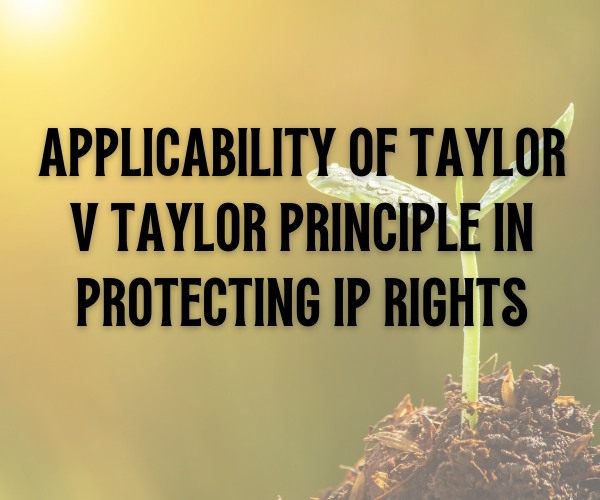
The principle of Taylor v Taylor originated in the year 1876. Ever since the principle has been used multiple times in the field of intellectual property and others, to justify the statutory rules and command measures accordingly. This principle was first adopted in India, through Nazir Ahmad’s case wherein the importance of the principle was highlighted. The Judicial Committee in the above case, interpreted the principle as ‘when a statutory power is conferred for the first time upon a court, and the method to exercise the same is clearly stated, it is interpreted that no other method is to be adopted.’
This Principle is especially beneficial in the field of intellectual property as it places a strong emphasis on following the methods mentioned in the statutewhich in turn acts as a shield in protection of intellectual property rights. The principle mainly looks into mandating the rules of the statute that are applied thereby mandating the application process, the review process, advertising process of the Trademark/patent/copyright in accordance with the statutory rules provided and nothing beyond the scope of it.
This principle is highlighted in the recent case of, Nuziveedu Seeds Pvt Ltd V. The Protection Of Plan Variety And Farmers Rights Authority And Ors.The case revolves around the statutory provisions of ‘The Protection Of Plan Variety And Farmers Rights’ (Herein referred to as the PVV Act) and issues raised within the Act.
The case is an amalgamation of various writ petitions filed pertaining to the registration of plant varieties developed by the farmers. The Appellants in the case advertised the Plan variety before Distinctness, Uniformity, and Stability (DUS), all the parties are believed to have acted in the manner prescribed and contested the provisions of the PVV Act.
However, upon a detailed observation made by Judge C.HARI SHANKAR J, it was found that the statutory provisions were interpreted differently.
The issues that are of important focus area were,
- Whether Distinctness, Uniformity, and Stability (DUS) testing has to be conducted before acceptance of the application as under Section 20 of the Act
- Whether Delay in filing the oppositions by the petitioners was permitted.
The Applicable laws were,
Section 19 -mandates that Distinctness, Uniformity and Stability (DUS) testing be done on the concerned plant seed varieties to determine whether they comply with the standards prescribed by the regulation.
Section 20 – Deals with the power of the Registrar to accept or reject the application made in line with the Act or Rules and Regulations.
Analysis:
On the Question of whether Distinctness, Uniformity and Stability (DUS) testing have to be conducted before acceptance of the application as under Section 20 of the Act
- It was contended that proceeding to advertise the petitioner’s applications without prior DUS testing must standab initio.
- Although, not expressly mentioned that the Registrar is required to await the result of the DUS Test before accepting the application, nevertheless, the Registrar must conduct an investigation into the details provided in the application to make a well-informed decision on whether to approve or deny the application.
- Thus, the court stated that such an application can be accepted only once the DUS test is satisfied. Later the Application is required to be advertised.
- Further, the Registrar and his examination are limited to the opposition that may be filed following such advertisement.
- The Scheme of Chapter III of the PVV Act regarding registration of the varieties makes it clear that qualifying for the DUS test is an essential criterion for acceptance of an application under Section 20 of the Act.
On the second Question of whether delay in filing the oppositions by the petitioners was permitted. The court noted thatalthough Rule 32 of the PPV Rules mandates that there shall be ‘no extension’ the court noted that the word ‘shall’ will be read as ‘may’ and thus, such a delay is condonable.
Therefore, the principle of Taylor v. Taylor, which states that when apower is vested in someone to do a certain thing in a certain way, the thing must be done in that way or not at all and that other methods of performance are necessarily forbidden, has been followed throughout the length of the case, as seen while determining the essentiality of the Distinctness, Uniformity and Stability (DUS) testing prior to advertising of plan variety and dealing with the delay in filing opposition, The court has acted in the interest of protection of the plant seed varieties and farmer’s rights.
*Written by Pranjali G Hegde, Legal Intern @Intepat IP
